Happy Thursday! We want to make The Dispatch even better for you. Our team is conducting a quick summer research project to understand what’s working well and what we could improve in your reading experience.
Would you mind taking five minutes to share your thoughts? Your feedback will help us deliver the quality news coverage you expect and enhance the features that matter most to you.
Happy Thursday! High Noon announced a recall this week after its alcoholic seltzers were mistakenly packaged as Celsius energy drinks. Relatedly, you’ll have to forgive our caffeine-dependent editing team for any typos you come across in this morning’s TMD.
Quick Hits: Today’s Top Stories
- Canada plans to recognize a Palestinian state at the United Nations General Assembly in September, Canadian Prime Minister Mark Carney said Wednesday. His decision followed similar announcements by France and the United Kingdom, which said Tuesday that it intends to recognize Palestinian statehood if Israel doesn’t take steps to end the war in Gaza. “Canada has long been committed to a two-state solution, an independent, viable and sovereign Palestinian state living side by side with the State of Israel in peace and security,” Carney said, calling on the Palestinian Authority to hold elections in 2026.
- President Donald Trump announced Wednesday that the U.S. had reached a “Full and Complete” trade deal with South Korea, two days before the White House’s sweeping new duties are set to take effect. According to the president, the agreement will set the U.S. tariff rate on Seoul at 15 percent and the country will, in turn, eliminate duties on American products. The levies on South Korean goods are well shy of the 25 percent rate Trump had previously threatened, but significantly higher than the previous tax on goods from the Asian ally. Under the deal’s terms, South Korea will also invest $350 billion in the U.S., in addition to buying $100 billion in American liquefied natural gas.
- The Treasury Department on Wednesday announced sanctions on Brazilian Supreme Court Justice Alexandre de Moraes, who is overseeing the country’s case against former President Jair Bolsonaro. In a statement, Secretary of State Marco Rubio alleged Moraes had engaged in a “targeted and politically motivated effort” to “silence political critics” and undermine freedom of speech. Also on Wednesday, Trump imposed 40 percent tariffs on Brazilian goods, bringing the country’s tariff rate to 50 percent, to combat the alleged “witch hunt” against Bolsonaro. However, the new duties include several carveouts, including on aircraft components, natural gas, and Brazil nuts.
- Trump on Wednesday announced plans to impose a 25 percent tariff on Indian products, effective August 1. He said the rate, which is slightly lower than his previously threatened tariff of 26 percent on the key trade partner, will be accompanied by an unspecified “penalty” for India’s continued purchase of military equipment and energy from Russia. “WE HAVE A MASSIVE TRADE DEFICIT WITH INDIA,” Trump added in a later Truth Social post. Meanwhile, India’s Ministry of Commerce and Industry said New Delhi would “take all steps necessary to secure our national interest” in a Wednesday statement.
- The Federal Reserve held interest rates steady at 4.25 to 4.5 percent on Wednesday, the fifth time in a row the central bank has left rates unchanged. “Although swings in net exports continue to affect the data, recent indicators suggest that growth of economic activity moderated in the first half of the year,” the Federal Open Market Committee said in a statement. It added that while unemployment “remains low” and the labor market is stable, inflation is still “somewhat elevated.” While the Federal Reserve has held the federal funds target rate steady since December 2024, Trump has amplified his criticism of Fed Chairman Jerome Powell for not lowering interest rates in recent months, referring to him as the “Worst Federal Reserve Chairman in History” in a social media post. While Powell’s term ends in May 2026, Trump—who appointed Powell in 2018—said last month he has “three or four” candidates in mind to replace him as Fed chairman.
- Defense Secretary Pete Hegseth on Wednesday ordered a review of AUKUS, a trilateral defense partnership between the U.S., U.K., and Australia formed under the Biden administration in 2021. The announcement followed a report by the Financial Times last month that the Pentagon would review the defense pact, which includes prospective Australian purchases of U.S.-made, nuclear-powered submarines. U.S. Under Secretary of Defense Elbridge Colby, who is leading the review and has previously criticized the deal, said Wednesday that his team will assess the “initiative’s alignment with President Trump’s America First approach.”
- The Health and Human Services (HHS) Department’s top vaccine official, Vinay Prasad, resigned from the federal agency late on Tuesday, one week after longtime Trump ally and internet provocateur Laura Loomer called for him to be fired and accused him of embracing “anti-Trump rhetoric.” Citing statements Prasad posted to social media in the last four years, in which he highlights his support for certain Democratic politicians and progressive policy positions, Loomer concluded that he was a “progressive leftist saboteur” seeking to undermine the agency. According to an HHS statement, Prasad “did not want to be a distraction” and was resigning “to spend more time with his family.”
- The Senate voted 51-47 on Wednesday to confirm Susan Monarez as director of the Centers for Disease Control and Prevention (CDC), a position she’s held on an acting basis since January 23. The vote fell along party lines, with two GOP senators not voting. Monarez is the first CDC director since 1953 to not hold a medical degree, though she holds a doctorate in microbiology and immunology. Before joining the second Trump administration, she was deputy director of an HHS research funding group formed in 2022 under the Biden administration, and prior to that, held roles in the first Trump, Obama, and Bush presidential administrations.
- The University of California, Los Angeles, reached a $6.13 million settlement on Tuesday with three Jewish students and a professor who sued the college after 2024 anti-Israel protests blocked their access to certain parts of campus. The university’s complacency amounted to illegal discrimination, the lawsuit argued, noting that college administrators did not immediately stop protesters from setting up a zone that excluded those who did not renounce their support for Israel. Under the settlement, UCLA will distribute $2.33 million among eight organizations combating antisemitism, while $320,000 will go toward the university’s Initiative to Combat Antisemitism. Separately, an investigation by the Justice Department concluded Tuesday that UCLA had failed to adequately respond to “severe, pervasive, and objectively offensive harassment and abuse” faced by Jewish and Israeli students after October 7, 2023, alleging that the school had violated both the Equal Protection Clause of the 14th Amendment and Title VI of the 1964 Civil Rights Law.
‘The United States of Artificial Intelligence’

Earlier this month, AI chipmaker Nvidia soared past a $4 trillion market cap, making its value higher than the GDPs of all but three countries in yet another sign of AI’s massive presence in economic markets. “If this keeps up, we’ll all be pledging allegiance to the flag of the United States of Artificial Intelligence!” ChatGPT told TMD.
Clearly AI isn’t ready to take over this newsletter just yet, but Americans are worried that other professions might not be so lucky. An April survey by the Pew Research Center found that 64 percent of U.S. adults believe that AI will lead to fewer jobs over the next two decades, while just 5 percent think it will lead to more jobs. AI seems poised to disrupt the global economy, but the questions of how—and to what extent—remain.
AI optimists are convinced that the new technology is going to propel the global economy into extreme levels of economic growth, believing that GDP growth could explode to an unprecedented 20-30 percent annually in the near future. Researchers at Epoch AI estimate that if AI is able to automate 30 percent of tasks, GDP growth would be 20 percent.
Such growth would be enabled by self-improving AI. A widely circulated paper called “AI 2027” claims that AI could become super-intelligent in the next few years, and when increasingly intelligent models develop and train future models instead of human developers, AI models will begin to improve at an exponentially increasing pace. According to the paper, this could lead to unimaginable technological innovation, world peace, and one world government by 2030—or a Terminator-like human extinction event that could be the end result of moving too fast with AI models that don’t have humanity’s best interests in mind.
“My experience, talking with a lot of those folks, is that the real difference [in Silicon Valley] is between people who think this is all going to happen by 2027 and those who think it’s going to happen by 2035,” James Pethokoukis, a senior fellow at the American Enterprise Institute, told TMD. “The cautious people are like, ‘It’ll take a decade.’ That’s not like the Fed or [Congressional Budget Office] forecasts.” The Fed, for example, predicts annual GDP growth of roughly 2 percent over the longer run.
Economists, on the other hand—while acknowledging AI’s potential to increase productivity—are less convinced that AI will drastically shift the economic landscape. At least for now.
JP Morgan anticipates an 8-9 percent boost to GDP over the course of the next decade—a very different prediction than 30 percent annual growth some in the tech world are promising. Goldman Sachs is more bullish on AI, estimating a 15 percent GDP increase over the next decade—strong growth, but not “world peace” levels. Other economists are less optimistic. MIT professor Daron Acemoglu predicts that, in the next decade, AI will only raise GDP by roughly 1 percent, assuming that the technology is only able to automate 5 percent of tasks.
While AI is already drawing billions of dollars of investment and is driving much of the stock market’s growth, economists are looking at different indicators to determine how much the technology will boost the overall economy. Whether businesses are adopting AI, working it into their business operations, and observing improved worker productivity matters much more to overall GDP growth. These are the metrics economists have their eyes on, and so far, they aren’t matching up with Silicon Valley’s lofty predictions.
“The adoption of this technology has been fast compared to some technologies of the past, but the general economist answer is that something can be really amazing in the lab, but it takes businesses a long time to figure out how to effectively use these technologies,” Pethokoukis said.
Right now, businesses are keen to adopt AI, but they’ve yet to see significant company-wide improvement. McKinsey & Company analysts assessed that 78 percent of companies are using AI in at least one business function, but only 19 percent of C-Suite executives reported a more than 5 percent increase in revenue, and 74 percent said AI adoption had either increased or not changed their costs. Many firms may be looking longer-term. According to McKinsey, 51 percent of executives say they expect AI to increase revenue by more than 5 percent in the next three years.
“I think there is every indication this is a very important technology and what they call a ‘general-purpose technology,’ meaning it can be used in lots of different industries. … It’s more like electricity or the internet. If you assume that it’s kind of like the internet, then it will eventually make people more productive and that will show up in the data. That’s sort of the cautious, non-Silicon Valley expectation,” Pethokoukis said. “The Silicon Valley expectation can be science-fictional sometimes.”
But while the technology could lead to growth in economic output, many are concerned that AI will soon shut humans out of the job market. And there’s some anecdotal evidence that it may already be happening. The Wall Street Journal reported this week that AI is taking over entry-level jobs that would otherwise go to recent college graduates. The New York Federal Reserve reported that the unemployment rate for recent college graduates currently sits at 5.8 percent, its highest rate since 2021.
But there are likely other factors at play. “We’re still a little ways away from seeing AI showing up truly in labor market data. There’s a lot of anecdotes about this happening, about entry-level jobs disappearing and it being a really hard time for college graduates, but there are a lot of additional factors that are going on in the economy that make it really difficult to say whether this is truly AI or not,” Tobias Sytsma, an economist at RAND, told TMD. “Even just business uncertainty can reduce hiring in different industries.”
Looking at whether entry-level job shortages persist over the next few years will paint a clearer picture as to whether AI is currently disrupting the workforce at a large scale. “That could be a sign of what’s to come, or it could just be we’re seeing a bunch of things in the economy and we’re trying to assign causality to something that maybe is just correlational,” Sytsma said.
Most industries are also not using AI at a large enough scale to cause significant labor market disruption yet, either. “Business adoption rates are still very, very low,” Pethokoukis said. “It’d be surprising if we had this huge impact.” According to Goldman Sachs research, sectors more exposed to AI have shown few statistically significant differences in key labor market indicators—such as job growth, wage gains, unemployment rates, and layoff rates—from sectors that are less exposed.
Silicon Valley, however, is prepared for a much faster change. The CEO of the AI company Anthropic said he anticipates that unemployment could jump to 20 percent in the next one to five years. Such levels, coupled with extremely high GDP, could reshape the entire economy, pushing people to own capital rather than hold a job. Investments would pay off in a booming, but workerless, economy—holding a job would no longer be the most reliable way to make money.
But key bottlenecks will likely slow AI’s effect on the economy. Companies building data centers are struggling to meet the energy demand, and there are already arguments over who is going to pay for the inevitable upgrades to aging U.S. power infrastructure. “We’re having trouble building in a quick, budgetary way, all these new power sources,” Pethokoukis said. “All those kinds of bottlenecks don’t go away just because you have an AI model that can pass every benchmark or Math Olympics.”
Businesses also need to trust AI for it to be adopted widely. The technology is far from perfect, as demonstrated by Grok of xAI’s recent dalliance with hate speech. If business leaders believe AI isn’t ready for use in higher-risk decisions, it could limit adoption. Companies still have not seen significant revenue boosts or cost reductions from AI, either. If the technology continues to be financially unviable, AI’s impact on the economy will be muted. It doesn’t mean Silicon Valley’s hopes are necessarily wrong, but radical economic changes might be farther off than tech CEOs might envision.
“There are a lot of vibes-based forecasts. It doesn’t come from history,” Pethokoukis said. “For now, I’ll go with economic history, but I’m open to that the vibes might be right.”
Today’s Must-Read
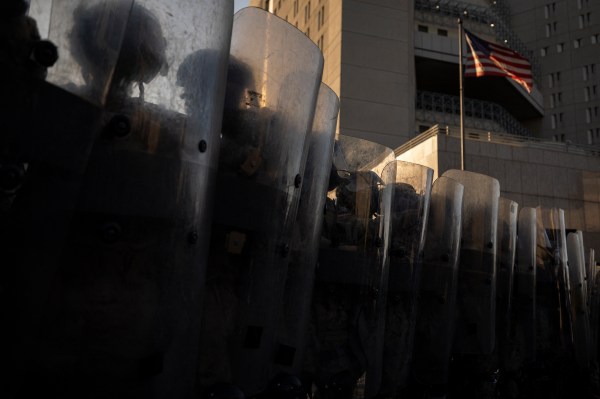
Not Everything Is an Emergency
Toeing the Company Line

It’s Just a Pun, People


‘Bidenomics’ at 3: Invisible Waste Becomes (More) Visible

A Famous Conservative, Liberal With People
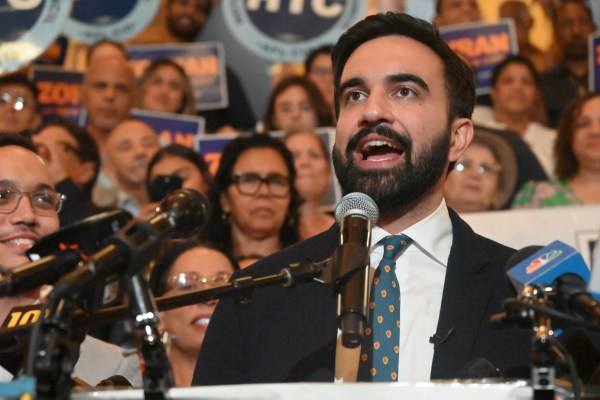
New York Professionals Increasingly Anxious About Zohran Mamdani

Guns, Gays, and Birthright Citizenship

Ask Me Anything, Pt. 2 | Interview: Sarah Isgur
Worth Your Time
Amid Donald Trump’s threats of sweeping tariffs, economic doomsaying has largely come up short. Writing for his Substack, Derek Thompson unpacked the confusing state of the U.S. economy. “I think it’s alright for folks who are deeply critical of Trump and his neo-mercantalist policies to allow for a bit of curiosity and humility here. Disaster was predicted. Disaster isn’t here. Not yet, at least.” Why? The answer may be economic resiliency: “One reason the U.S. seems un-killable is that our economy is so large that it can only be tipped into recession by sufficiently significant developments. ‘If you asked everyone in the country to come together and set fire to $1,000, that would seem like a phenomenally stupid idea, and for decades, you’d remember the president who came up with it,’ the Harvard economist Jason Furman told me on my podcast Plain English. Economic growth in 2025 looks like it’s about 0.5 percentage points off from its pre-Trump trajectory dating back to late 2024.” But that doesn’t mean there’s no economic loss: ‘Half a point off growth is about a thousand dollars per household,’ Furman said.”
Presented Without Comment
Associated Press: Trump Calls GOP’s Hawley ‘Second Tier’ Senator After Stock Trading Ban Bill Advances
Also Presented Without Comment
Reuters: Bessent Warns China On Russian Oil Purchases That Could Bring 100% Tariffs
U.S. Treasury Secretary Scott Bessent on Tuesday said he warned Chinese officials that continued purchases of sanctioned Russian oil would lead to big tariffs due to legislation in Congress, but was told that Beijing would protect its energy sovereignty.
Wrapping up two days of U.S.-China trade talks in Stockholm, Bessent said he also expressed U.S. displeasure at China’s continued purchases of sanctioned Iranian oil, and its sales of over $15 billion worth of dual-use technology goods to Russia that have bolstered Moscow’s war against Ukraine.
In the Zeitgeist
You don’t have to be a kid to enjoy the original Zootopia, so go ahead and indulge in the Zootopia 2 trailer released Tuesday.
Let Us Know
Are you concerned about AI’s effects on the job market?

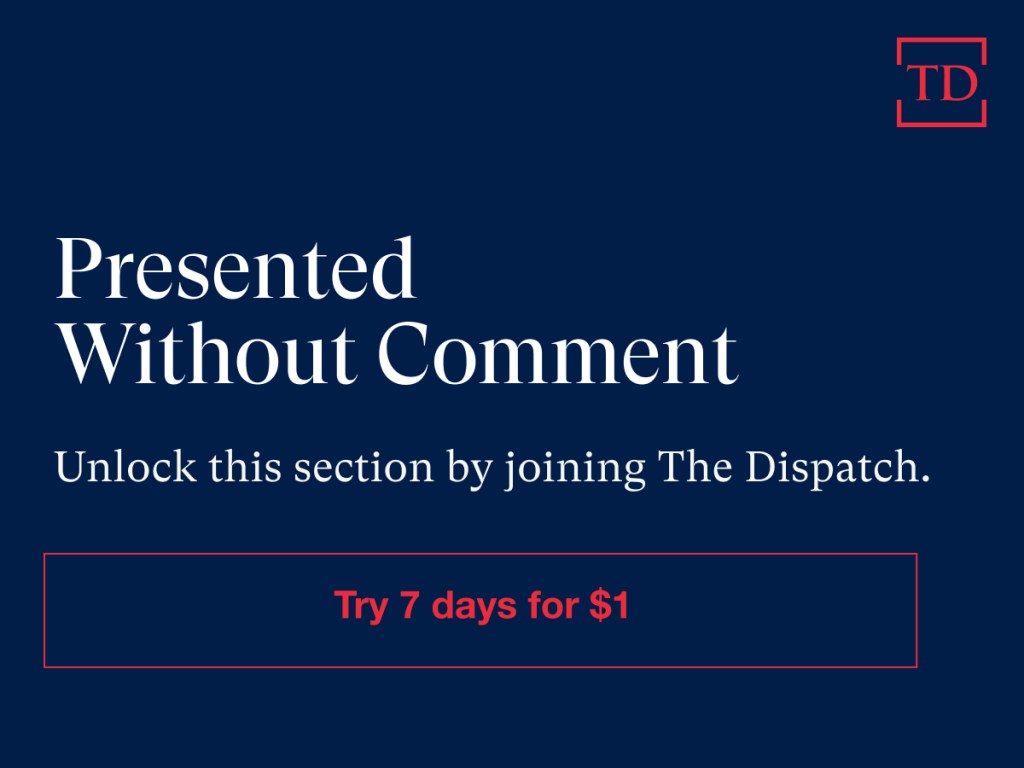



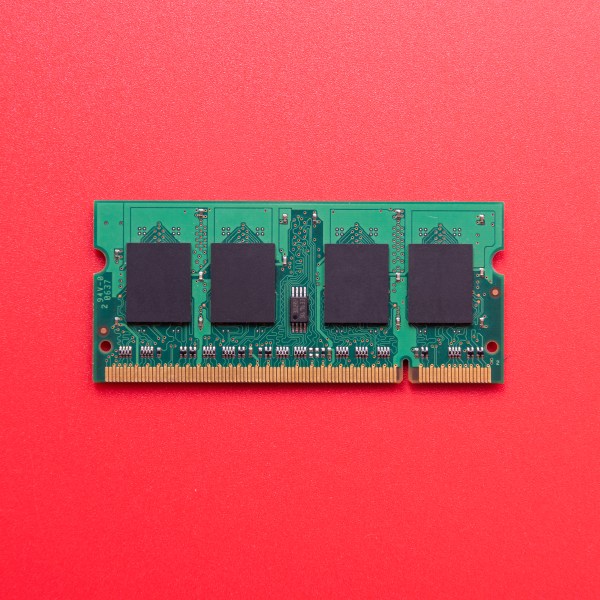
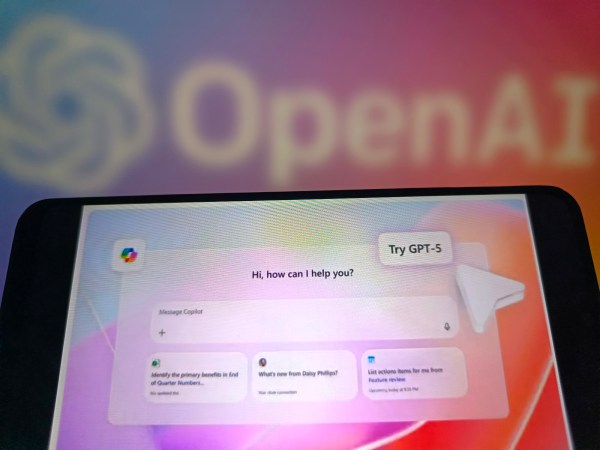






Please note that we at The Dispatch hold ourselves, our work, and our commenters to a higher standard than other places on the internet. We welcome comments that foster genuine debate or discussion—including comments critical of us or our work—but responses that include ad hominem attacks on fellow Dispatch members or are intended to stoke fear and anger may be moderated.
With your membership, you only have the ability to comment on The Morning Dispatch articles. Consider upgrading to join the conversation everywhere.